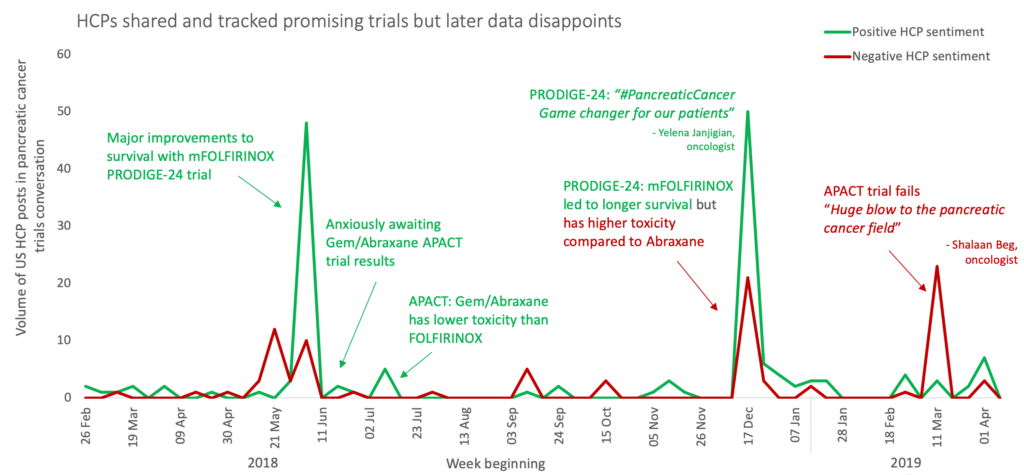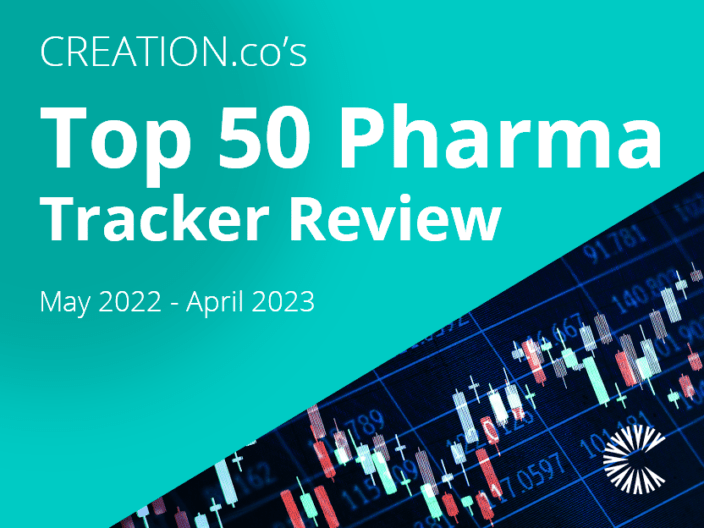If you could listen to the conversations of healthcare professionals (HCPs) online and discover what they think then you could understand how to engage them in a meaningful way about issues they care about, using language they already use.
Learning from HCPs’ thoughts about your pipeline products
It may be relevant to discover what HCPs really feel about the products that you have in development. If you are a pharmaceutical product leader, it is likely that HCPs are shaping their perceptions of your product well before you have developed your brand plan.
We carried out a study into pancreatic cancer and saw HCPs talking about diagnosis and treatment of the disease. Since there are several long-awaited new treatments emerging, we saw a real passion among HCPs to understand data on new products, discuss it together, and consider what it means going forward.
Following negative results from the APACT trial, Shaalan Beg, a gastrointestinal oncologist, created a poll asking his peers “what will be your preferred option?”. 39 people responded which created an incredible learning resource for anyone else wanting to consider implications following the trial.
After the 'negative' APACT results, what will be your preferred option for adjuvant therapy in resected pancreas cancer patients who are NOT candidates for mFOLFIRINOX?#PancChat #pancsm #ASCO19 #gi19 #GIOnc
— Shaalan Beg MD MBA FASCO (@ShaalanBeg) March 14, 2019
Studying the online conversation among HCPs allows us to track changes in their attitudes in response to changes in the environment. In this example, again for our study into pancreatic cancer, we isolated the specific conversation about key trials.

In the graph above, the green lines indicate the positive sentiment toward to the trials, while the red shows disappointment, the negative sentiment. We saw that HCPs were very enthusiastic early on when they heard about new trials. Then as we tracked their conversation responding to the data, the APACT trial failure was described as a “huge blow for the pancreatic cancer field”. We see that HCPs were positive about longer survival but had concerns over higher toxicity.
These different perspectives from HCPs provide rapid insights to their response as data emerges. When planning for your brand, changes in the HCP perspective can guide your messaging, shaping your content and the conversations you have with customers, even while products are still in the pipeline.
Learning from HCPs’ concerns
When thinking about content planning it is essential to speak the right message and use the language that your customers are using. When HCPs talk online, they often discuss the burden of disease and patient concerns as well as discussing efficacy, pricing and medicine administration. These conversations highlight customer needs that are likely to be specific to each role type and market.
One unmet need we saw in our pancreatic cancer study was where HCPs frequently discussed sequencing of surgery prior to drug treatment. Currently surgery is used prior to drug treatment, however there is an emerging conversation with HCPs sharing results of clinical trials and patient cases that look to use drug treatment first.
Comment
byu/Anxietylife4 from discussion
inpancreaticcancer
Read the next article in the series:

Transforming your pharma brand strategy: Congress tactics
Read article
To understand how HCP insights could support your brand, download the complete white paper or get in touch.
 By Luke Wilson
By Luke Wilson 


